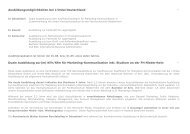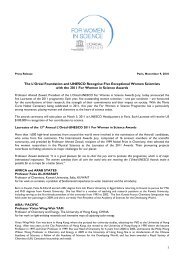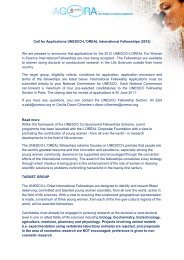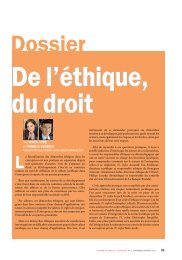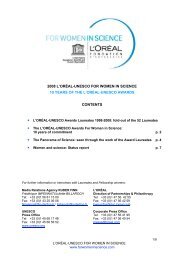2011 EDITION
2011 EDITION
2011 EDITION
Create successful ePaper yourself
Turn your PDF publications into a flip-book with our unique Google optimized e-Paper software.
For her work on corrosion,<br />
a problem of fundamental importance<br />
to water treatment and<br />
the oil industry<br />
without producing benzene. This was a veritable revolution for<br />
the refining industry, reducing costs and making it safer for<br />
refinery workers, the environment and the general public. It<br />
was also a major advance for water treatment, since this new<br />
class of catalyst can also be used to extract certain pollutants<br />
from drinking water.<br />
A Career in Chemistry<br />
After earning a BSc degree from Ain Shams University in<br />
Egypt, Faiza Al-Kharafi received her MSc and PhD from<br />
Kuwait University, where she joined the faculty in 1967.<br />
From 1993 to 2002 she served as head of the Chemistry<br />
Department, Dean of the Faculty of Science and President<br />
of the University, becoming the first woman to head a major<br />
university in the Arab world. In 2002, she left her university<br />
post to serve on the Kuwaiti government’s Supreme Council<br />
of Planning and Development.<br />
Professor Al-Kharafi has greatly contributed to the promotion<br />
of science in Kuwait. She has been the research director for<br />
over twenty research projects in corrosion and has facilitated<br />
fruitful international collaborations between Kuwait University<br />
and other universities in France and around the world. She is<br />
a member of the United Nations University Council and Vice<br />
President of The Academy of Sciences for the Developing<br />
World.<br />
FAIZA<br />
AL-KHARAFI<br />
IN HER OWN<br />
WORDS<br />
EXEMPLARY DEDICATION<br />
Faiza Al-Kharafi has been committed<br />
to science since a young age.<br />
She went on to become a leading<br />
scientific figure in Kuwait, experiencing<br />
first-hand women’s contribution<br />
to the development of science<br />
and their strong commitment. As<br />
president of Kuwait University from<br />
1993 to 2002, she was in charge<br />
of 1,500 staff members, more than<br />
5000 employees and more than<br />
20,000 students annually. Today,<br />
she emphasises the important role<br />
women play in scientific research.<br />
“In the Faculty of Science at Kuwait<br />
University, more than 40 percent<br />
of the staff members and students<br />
are female. Their contribution to the<br />
development of science in general<br />
is very important.”<br />
A WOMAN WHO ACCEPTS<br />
CHALLENgES<br />
Throughout her career, Faiza<br />
Al-Kharafi has noted how “many<br />
people underestimated the abilities<br />
of women in science,” she explains.<br />
“Another big challenge was finding<br />
the right balance between my work<br />
and raising my children. By hard<br />
work, dedication and commitment,<br />
and also thanks to time management<br />
and family help,” she says,<br />
she was able to succeed at this<br />
difficult juggling act.<br />
Professor Al-Kharafi is extremely<br />
pleased to receive this award that<br />
promotes the cause of women<br />
scientists. “I very much hope that<br />
this prize will encourage young<br />
people – especially girls – to<br />
specialise in scientific fields and be<br />
more involved and committed to<br />
the development of society.”



